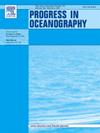Drivers of trophodynamics of the open-ocean and deep-sea environments of the Azores, NE Atlantic
IF 3.8
3区 地球科学
Q1 OCEANOGRAPHY
引用次数: 0
Abstract
Marine ecosystems associated with mid-oceanic elevations harbour unique pelagic and benthic biodiversity and sustain food webs critical for Nature’s contributions to people (NCP). The United Nations Sustainable Development Goals and the Convention on the Law of the Sea recognize the need to implement ecosystem-based management approaches to conserve the structure and functioning of oceanic and deep-sea ecosystems within sustainable reference points. However, uncertainties regarding the interactions between multiple drivers of change, and their impacts on the state of these ecosystems and the NCP, present significant challenges to effective management. Trophic models offer a holistic approach to identify the main drivers affecting the dynamics of marine ecosystems. Here, we used a food web model of the open-ocean and deep-sea environments of the Azores for identifying the drivers that best explain historical biomass trends of demersal fish of high commercial value. Our hindcast simulations suggested that historical trends can be explained by the combined effects of deep-sea fisheries exploitation and variability in environmental conditions, likely dominated by primary productivity anomalies. In particular, deficits in primary production and high levels of fishing exploitation might have contributed to the pronounced decline in biomass observed between 2008 and 2012. These findings reinforce that failure to consider environmental factors in ecosystem-based management may result in shortfalls at achieving biodiversity conservation and sustainability objectives, particularly in the context of climate change.
东北大西洋亚速尔群岛公海和深海环境营养动力学的驱动因素
与大洋中层海拔相关的海洋生态系统蕴藏着独特的浮游生物和底栖生物多样性,并维持着对大自然为人类做出贡献至关重要的食物网(NCP)。联合国可持续发展目标和《海洋法公约》承认有必要实施基于生态系统的管理方法,在可持续参考点范围内保护海洋和深海生态系统的结构和功能。然而,多种变化驱动因素之间的相互作用及其对这些生态系统状况和 NCP 的影响存在不确定性,给有效管理带来了巨大挑战。营养模型为确定影响海洋生态系统动态的主要驱动因素提供了一种整体方法。在此,我们使用亚速尔群岛公海和深海环境的食物网模型来确定最能解释具有高商业价值的底栖鱼类生物量历史趋势的驱动因素。我们的后报模拟结果表明,历史趋势可以用深海渔业开发和环境条件变化的综合影响来解释,而环境条件变化可能以初级生产力异常为主。特别是,初级生产力不足和高水平的渔业开发可能是造成 2008 年至 2012 年期间生物量明显下降的原因。这些研究结果进一步表明,在基于生态系统的管理中不考虑环境因素可能会导致无法实现生物多样性保护和可持续性目标,尤其是在气候变化的背景下。
本文章由计算机程序翻译,如有差异,请以英文原文为准。
求助全文
约1分钟内获得全文
求助全文
来源期刊

Progress in Oceanography
地学-海洋学
CiteScore
7.20
自引率
4.90%
发文量
138
审稿时长
3 months
期刊介绍:
Progress in Oceanography publishes the longer, more comprehensive papers that most oceanographers feel are necessary, on occasion, to do justice to their work. Contributions are generally either a review of an aspect of oceanography or a treatise on an expanding oceanographic subject. The articles cover the entire spectrum of disciplines within the science of oceanography. Occasionally volumes are devoted to collections of papers and conference proceedings of exceptional interest. Essential reading for all oceanographers.
 求助内容:
求助内容: 应助结果提醒方式:
应助结果提醒方式:


